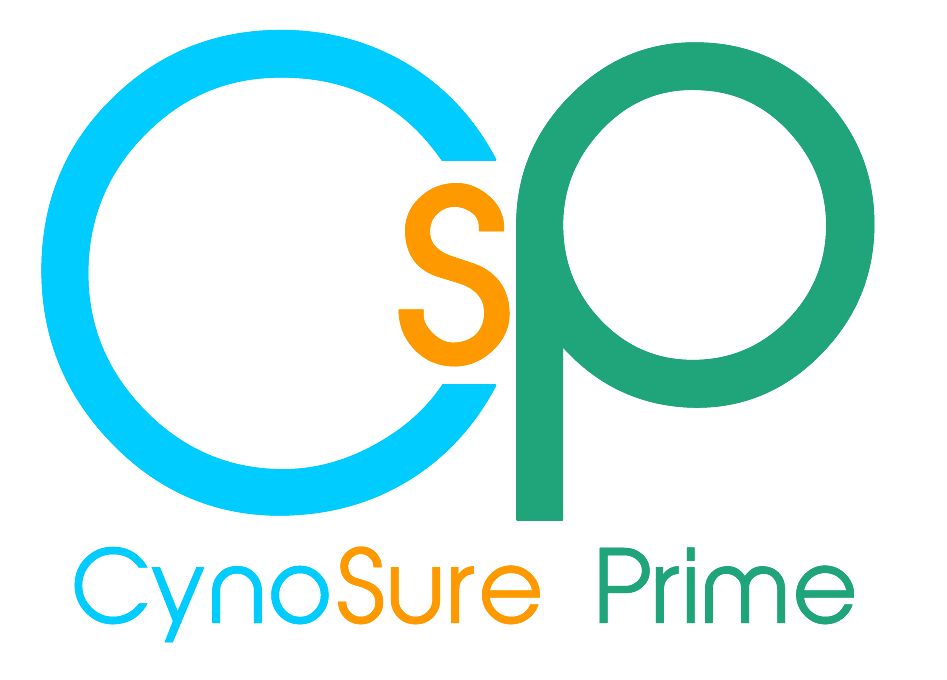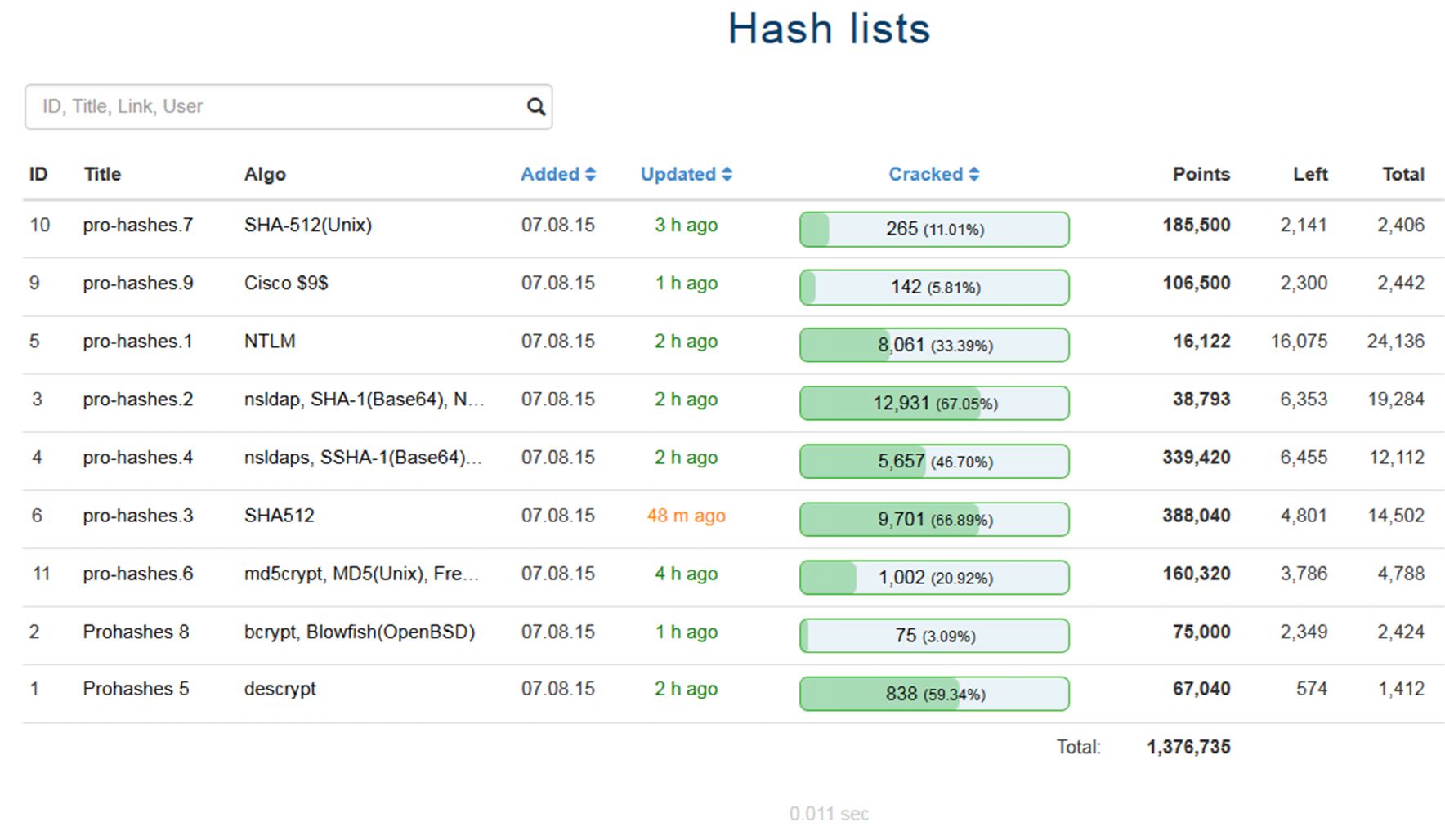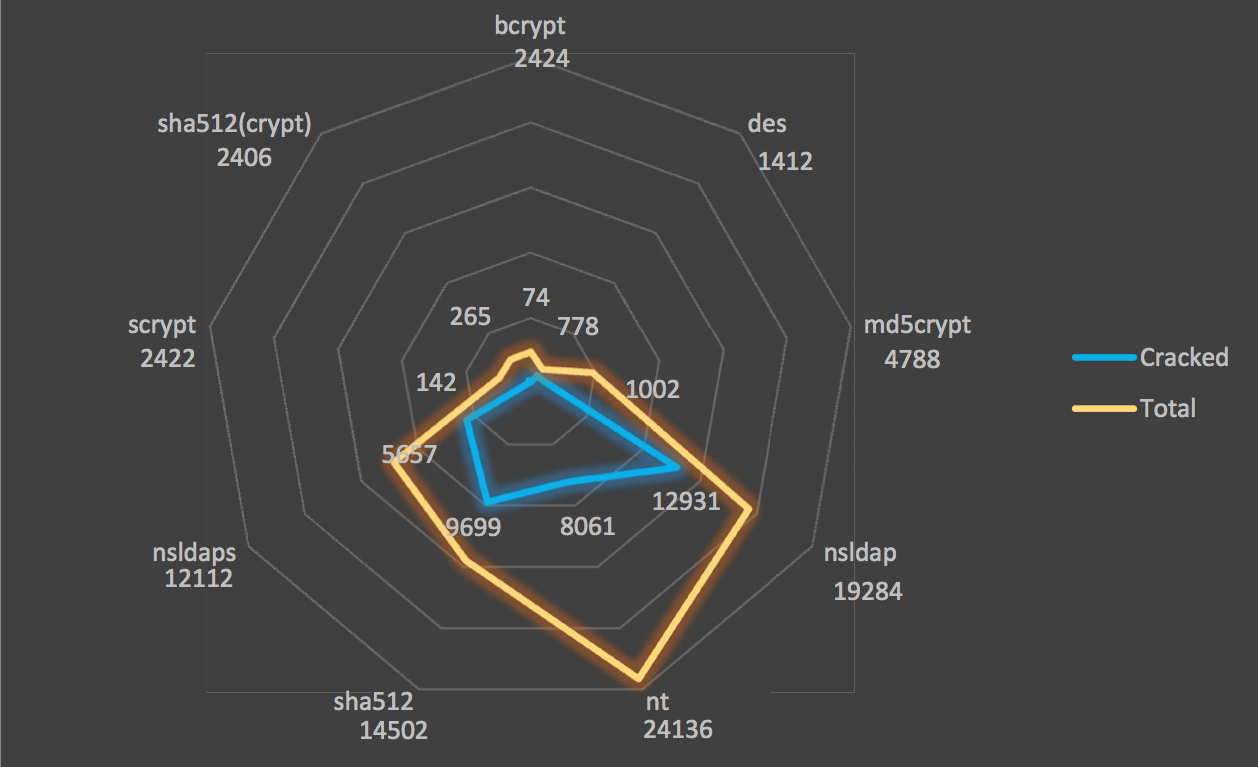Back to:
Top Teams
CynoSure Prime
Link to original writeup (external, pdf)
Resources
| Active Members
| 14
|
| Handles
| AMD, dook, splitter, winxp5421, blazer, gearjunkie, tony,
wonder, casha, hops, usasoft, cvsi, noob, waffle
|
| Software
| John the Ripper, Hashcat suite, TeamLogic (Hash Management team software),
Unified List Manager, MDXFind
|
| Hardware
| Roughly 100 CPU cores, roughly 50 GPUs
|

Crack me if you can
2015 write-up

A screenshot from our Hash Management System "TeamLogic" dashboard
Team Members
| AMD
| dook
| splitter
| winxp5421
|
| blazer
| gearjunkie
| tony
| wonder
|
| casha
| hops
| usasoft
|
|
| cvsi
| noob
| waffle
|
|
14 participating members, 12 active from all over the world
Before the contest
Prior to the contest several MPI clusters were set up rocking the
latest Bleeding-Jumbo, props to the JtR community for their marvelous
work on John-the-ripper. Our hash management system "TeamLogic" was
also updated for improved dynamic hash format support as we expected
really exotic algorithms to be added to the mix. We used a TeamSpeak3
server for primary communications and a forum reserved for
miscellaneous uses.
During the contest
After seeing the algorithms we decided to reserve all CPU resources
for the slow crypt functions including SHA-512(unix), scrypt &
bcrypt. All other algos including NTLM, SHA512, md5(crypt), descrypt
and nsldap/s were predominately run on GPU. While the hashes with
known hash types were being loaded into our hash management system, we
were able to leverage the simultaneous hash algorithm parallel
processing capability of MDXfind to rapidly identify ambiguous hash
types. A very early analysis of our initial cracks revealed that we
were dealing with foreign passwords, through the use of MDXfind as a
wordlist parser, we were able to quickly filter through our lists
selecting only passwords with foreign characters. Dictionary attacks
against the slower algorithms were immediately started early on and we
had hits across all algorithms roughly 3 hours into the contest.
Upon noticing foreign passwords, our developer immediately enforced
strict $HEX[] encoding on all algorithms to ensure optimal
compatibility for plaintexts. Thankfully, our system was already UTF-8
compliant so we didn't have issues at all submitting/exporting bad
plains, we didn't hear anything from KoreLogic, so assumed we were
doing it right.
The basic approach was simple, identify patterns in the quicker algos
and slowly work our way up in algorithm complexity, applying the same
rules and patterns. Two algorithms, namely NTLM and
MD5(crypt)/des(crypt) weren't of particular interest to us, as they
were either too low in points or not worth their crack value, these
were not a high priority for us. However, we couldn't help ourselves
from the slow bcrypt hashes especially since they were 1000 points
each.
Initial attacks using ?b?b masks were carried out to test the waters,
once enough information was gathered we switched to a much more
efficient method of emulating specific mask attacks by using
pre-generated lists in combination attacks. Similarly we were able to
modify our rule processor "Rulify3" to accommodate for multi-byte
character replacement. Custom rule processors weren't really
necessary, by understanding the basic principles of UTF-8 encoding and
how a rule processor functions, we were able to successfully emulate
UTF-8 characters, and incorporate them into our attacks by crafting
special rules which could be used with standard rule processors.
Several hours into the competition our team automagically
divided into two groups, one group attacked whatever they wanted with
whatever they wanted. The second group focused on maximizing and
optimizing pattern attacks and crafting specialized attacks, but more
importantly ensuring there was as little resource idling as possible.
Resources were continuously shared between the two groups. Without the
tremendous efforts of group one, group two wouldn't have been able
continuously obtain unique data for analysis to refine attacks. This
was only made possible by combining the different skillsets of each
member and working in unity.
For some visuals please refer to the figure below which depicts the
hash/crack distribution spread for our team. Orange denotes total
hashes for each algorithm while blue shows indicates the number of
cracks carried out by our team.

Patterns
UTF-8 (ASCII look-a-like charset) /&%%#
These were detected and 3 dictionaries where produced: singles,
doubles, triples. Using a combination attack mode, this allowed us to
"bruteforce" the full keyspace for "length 4" and "length 5" of this
mixed ascii + UTF-8 keyspace giving us very successful results across
all algorithms. This one was slightly tricky as it appeared KoreLogic
had also mixed in standard ascii characters into the keyspace. We did
not have time to thoroughly explore the other look-a-like alpha
characters and only dealt with the symbols and numbers, however did
note their presence.
Korean alphabet Hangul / kieukssangdigeutchieut
Similar to the above, we produced singles, doubles and triples of the
Korean Hangul alphabet and used them in combination attacks across all
algorithms for combinations of 2,3 & 4.
German, Finnish, French, Danish and other European words / attaché
Rulify3 was modified to incorporate the "~" rule (~XYZ, swaps X for
YZ) supporting 1 to 2 byte character swaps, our wordlists were run
through this tool and then dictionaries generated were uniqued and run
through as dict attacks. Existing dictionaries where filtered either
with Unified List manager (ULM) or MDXfind to select for extended
ascii or UTF-8 containing character containing words.
Other Tibetan, Chinese, Japanese, Cyrillic, Arabic charsets
UTF-8 charsets were extracted from our founds; these charsets were
then expanded for better coverage. These UTF-8 encoded characters were
then reversed as their byte form followed by expansion using ULM's
prefix everywhere function, transforming them into "multi-byte
insertion rules" which were compatible with existing non-UTF-8 aware
rule processors. We used this technique to target and insert UTF-8
characters into various positions across our wordlists for hybrid rule
attacks. We found these rules worked well when paired with small
standard clean dictionaries for target languages. We also yielded
success when stacking the "c" rule. Overwrite rules were generated in
a similar manner, instead we would insert dummy characters into the
wordlist to make up for bytes then overwrite them. However due to the
pairing of UTF-8 characters with specific groups of words it was more
optimal to use the aforementioned Rulify3 rule processor and the rule
sets with specific wordlists.
Other patterns / RageהMeze
Word UTF-8 Word, Word UTF-8 UTF-8 Word pattern was also detected,
however due to time constraints we were not able to fully scan this
small pattern across every algorithm. It however appeared that there
were only a limited number of word combinations.
Highlights
Some memorable moments would be; receiving a picture from one of the
members who was participating in the contest while attending a
wedding. It really gave us a good laugh to see his dedication. Another
instance one member gave us full reign of their GPU farm and we joked
that they would probably have a surprise power bill after we were
finished, considering the number of gpus and their lack of idle
time.... only to our surprise it was business as usual for
them.
Several hours in someone asked... "so when are the challenges coming
out?" "It's okay... give them twelve hours and we might have
something", someone else replied.
We didn't worry too much about the tweeted hints, until later in the
contest when we asked our rep to pay KoreLogic another visit to obtain
some intel (thanks dook!!). After promptly receiving the MD5 hashes
and just as quickly cracking them, we had a good laugh since it wasn't
like we didn't know all the passwords were foreign at that
point.
After the contest
Once the contest ended one of the members pointed out that not all
crackers were capable of cracking the UTF-8 encoded NTLM's properly,
while some other programs did. We suspect this is due to byte-order
reversal and zero adding in alternating steps as a "cheat" UTF-16LE
conversion in the MD4 digest, for optimization purposes. This would
have resulted in incorrect UTF-8 to UTF-16LE conversion leading to
hashes being missed, JtR did not appear to suffer this issue.
Thoughts
We may not have had the biggest team and probably didn't possess
largest amount of compute power. Considering the fact that we are a
relatively new team, we were able to work cohesively and use our
resources both efficiently and effectively resulting in placing 2nd
for KoreLogic's "Crack me if you can 2015". We have thoroughly
impressed ourselves; having beaten the former champions John-users and
InsidePro, we have demonstrated that we are worthy opponents.
Congratulations to Team Hashcat for taking the 1st place win.
Congratulations to "Shining Ponies", "Toil" and
"ICantBelieveItsNotButter", you guys also did an impressive job. If I
recall correctly, at one stage one of the street teams were actually
scoring higher than one of the pro teams.
Thank you to KoreLogic for hosting "Crack me if you can" for the 6th
time, we understand how difficult it is to come up with something
challenging. I guess UTF-8 password were simply inevitable, we really
appreciate your prompt replies preparedness and visuals on the
statistic pages.
#FOLLOW_US #JOIN_US #LOVE_US #HATE_US #CONTACT_US @CynoPrime
Twitter: @CynoPrime
Blog: cynosureprime.blogspot.com
Email: cynosureprime@gmail.com
Link to resource package (external)



